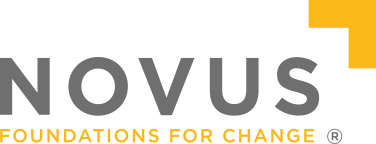Education in the prison system
Adult Provision

For over 30 years, Novus has worked with people of all ages to bring valuable education and enrichment programmes to prisons across England and Wales.
Over 47% of prisoners in the UK don’t have any formal education qualifications, so it's unsurprising that breaking the cycle of reoffending is virtually impossible without first introducing the importance of education to our learners.
By working with partner organisations and our educator teams, we provide routes to success for learners upon release, empowering them to re-enter their communities rehabilitated and ready to give back.
We operate in over 50 prisons and secure environments in England and Wales, offering a variety of education provisions for our learners, which match the demands of an ever-evolving job market.
What are the benefits of prison education?
Prison education is proven to offer extensive benefits, including:
-
Improved employment prospects
Individuals who receive an education while in prison are 13% more likely to find employment opportunities upon release. 57% of prisoners in the UK have low levels of literacy, meaning that even many entry level jobs are inaccessible to them. Novus encourages prisoners to learn to read and write, setting them up for success in their future job searches.
-
Prison education cuts costs
With an estimated annual cost of £18 billion for reoffending, prison education and training are not only beneficial for our learners; they're also incredibly cost-effective on an economic level across the UK.
Investing in prison education cuts spending in the long run by reducing the number of people reoffending and returning to prison.
With recruitment and onboarding costs soaring as the cost of living rises, the benefit of seeking talent through our channels is becoming more and more clear.
We involve employers in our curriculum creation, ensuring that our learners are equipped with important industry standard skills which will help them to succeed in their roles post-release.
In doing so, we create a pipeline from education to employment and help businesses train future employees - creating a pool of talent from which to source team members.
-
Promoting rehabilitation to reduce reoffending
Studies have shown that prisoners who take part in educational programs while in prison are less likely to reoffend and return to prison after release.
Education empowers prisoners to gain the knowledge and skill set they'll need to lead a productive life upon release, while also promoting personal development, self-esteem, and self-discipline.
Our network of partner organisations - alongside our expert education team- has enabled us to meet the needs of our most vulnerable learners. A study in 2016 found that as many as 32% of learners in prison were self-reported as having learning difficulties or disabilities.
As a provider of education in prisons and rehabilitation services, Novus offers opportunities for learners to overcome the impact of any previous negative experiences in schooling, while also encourgaing those with learning difficulties or disabilities to re-engage with their education.
-
Positive impact on the community
Providing prisoners with access to education and positive destinations after release isn't just about personal development; it's also about fostering safer and more prosperous communities across the nation.
Ex-offenders who engage with education, enrichment, and job training are more likely to become rehabilitated members of society, creating a positive knock-on impact on their communities.
As learners gain expanded knowledge and expertise, they not only enhance their employability but also gain a heightened sense of identity and self-worth.
This transformation significantly reduces the likelihood of ex-offenders returning to crime, reducing reoffending and making communities safer on a wider scale.
What are the challenges to prison education?
One of the biggest hurdles to our provision is that many prisoners have a limited history of formal education; many arrive in our classrooms with no qualifications and a lack of trust in the schooling system.
We work hard to rebuild this trust by engaging learners in creative enrichment sessions, while encouraging them to study further with us in our Vocational, Digital, English and Maths classes.
Another significant challenge is the movement of inmates between prison facilities. However, this only encourages us to maximise the time spent with our learners! After 30 years of championing prison education, we have designed a flexible and efficient approach to education, offering each learner the tools they need to succeed through our provisions - no matter how short our time with them is.
We work with educators to ensure that any movement is as seamless as possible by conducting assessments for learners upon their arrival at a new facility. Operating nationally, our educators and administrators have a keen understanding of how to navigate the intricacies of education in secure environments, allowing Novus to track learner progress as efficiently as possible.
What education is available for prisoners?
In both our adult and youth programmes, we offer a wide range of vocational and academic courses for learners to engage in. In a Novus education facility, learners can expect to take part in English and Maths studies, as well as digital and vocational skills classes. These subjects provide a basis for growth and are fundamental to success in the lives of learners, post-release.
Our vocational subjects are vast, and largely depend on the facilities available in each facility. In many locations, we offer bricklaying, joinery, and hairdressing; all skills which can lead directly into employment.
We work with employer partners to ensure that our learners gain relevant skills that will benefit them upon release. For these subjects, we aim to utilise educators who have experience in particular fields and who can therefore provide first-hand insights into preparing for a career.
Creative Enrichment in prison education
Another major component of our curriculum is our creative arts and enrichment provisions. Our education teams work with a variety of organisations and onsite resources to provide creative enrichment activities for our learners.
Enriching and engaging creative arts programmes, courses, initiatives, and learner opportunities all support health and well-being, while also improving behaviour and attainment.
Incorporating English, Maths, digital and vocational skills into these programmes helps re-engage learners and promote positive future outcomes.
Through outlets such as drama, book clubs, painting and music, we provide a soft introduction to education for those who have had limited or negative academic experiences.
Getting learners involved this way makes it easier to engage them in practical studies, while still strengthening fundamental skills like creativity and teamwork.
Who provides prison education in the UK
At Novus, we work in partnership with prisons, partner employers, and charitable organisations across England and Wales to supply education offerings at each location.
With over 50 locations, our specialist teams support adult and young offenders alike in developing skills and confidence to boost employability post-release from prison, and ultimately reduce re-offending.
Bringing education to adults and young people in custody gives them a path to breaking the cycle of reoffending and incarceration, while enhancing the opportunities that are available post-release.
If you’d like to learn more about the benefits of prison education for learners and their surrounding communities, listen to our Inside Learning: Talking Prison Education podcast.


